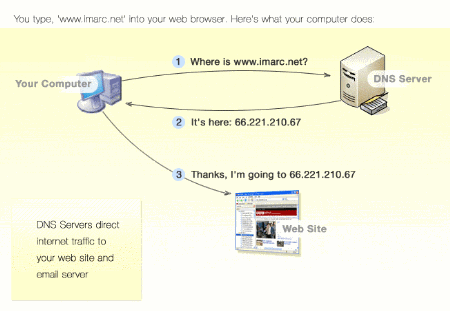Google Public DNS- a ploy to get handle on the real-time pulse of the internet?
Google has recently announced its own Public DNS system that will allow internet users the ability to bypass the ISP’s DNS servers and contact the Google’s Public DNS servers for resolving all DNs queries.
First some background on DNS. whenever you type a web address like http://google.com in your browser, the domain name address (google.com) needs to be translated into an IP address. This is done by contacting a Domain Name Server, which resolves the Fully Qualified Domain Name(FQDN) into the IP address of the server and returns that IP address in the response. Later , this Id address is used by the browser to contact the site end server ad get the content.

Thus, essentially , each time you type an address in your browser’s title bar, at least one DNS lookup is performed before the end server can be contacted and page fetched. Depending on the composition of the page, multiple DNS lookups may happen while loading a single page.
Google believes that your ISP’s DNS servers are not up to speed, and thus has offered its own public DNS system that will make the web faster (not again!) and more secure. It is not the first one to do so and OpenDNS has been offering a public DNS service for the past four years. You can read the OpenDNS reaction to Google’s announcement here.
TechCrunch , amongst others have reacted to the story and some legitimate concerns have been raised on the potential privacy implications- what if Google uses the DNS lookup data from the end user, links it to their Google account and gets more data to profile the web users? Google has reacted and denied that information collected will be used in this manner.
Other reactions have been focussed on the potential revenue,branding and advertising implications of the landing page that is used when DNS queries are not able to be resolved. Google has again denied that it will be using a Google branded landing page or redirection in case DNS queries do not resolve. However, point to note is that in most of the browsers (native in chrome or via Google toolbar installation in IE etc) in case a DNS query is not resolved , you do land in today’s world to a Google search page. So not much concession Google is making to the users by not providing a Google landing page, that is the default in today’s world too!!
Most interesting to me seems the implications of knowing in real-time what sites people from various geographic locations are trying to visit, based on DNS queries from that geographic location. That helps Google tailor its search results to geographical locations and possibly help compute the factor as to how much the site is being access is real time, a factor which can be used to pump up or down a sites ranking in the search results. To elaborate, suppose my blog site http://the-mouse-trap.com got dugg/salshdotted/TechCrunched /trak.ined /whatever and a large surge of traffic starts flowing from India/US/rest of the world to my blog, Google in today’s world has no way of knowing this, until users also start searching my blog on Google simultaneously.
Enter Public DNS, and not only will Google be immediately alerted that the mouse trap blog has become hot, but also that most of the traffic is from say India (because it has just or trak.ined) ; in that case it can change its algorithms such that mouse trap blog search results are pumped up , but only for google.co.in search page.
Tracking the users behaviour in Real-time and finding which content /site has become hot in real-time is a problem many have been grappling with and real-time search is a broad filed of enquiry in itself . By the public DNS sleight-of-hand, Google will get a big advantage overnight in this sphere. The question is do we really want to give Google so unfair an advantage in so many fields?
From my past few posts it may seem that I am quite paranoid when it comes to Google announcing anything to make the web faster…but let us also remember that like all corporate and businesses, Google is there to make money from knowing more about how people are browsing/searching the web, and runs one of the biggest advertising platform in the world. Given this, it behoves that we are more circumspect before taking the ‘making web faster’ rhetoric at face value. What do you think? Is there cause to be worried? Or can we still hope to get the best in a world that is dominated single-handed by Google?
img src: imarc.net

excellent post Sandy!
One good thing it’s gonna do is bring awareness to the alternative of using other DNS service rather than that provided by ISP. It might even give openDNS a wider audience as well.
I understand the concern for a more heterogeneous web, but frankly I am sucker for google services :D, I think without major privacy issues , google should be able to leverage this real time data for some excellent search results. I am sure in no time another search players gonna jump the bandwagon.
Definitely Google has advantage in this. Your query has a valid point bro.
look for “vivilproject dns” on a search engine or http://80.247.230.136/dns.htm and list a lot of public DNS other than google dns and opendns… i do not love my private surf can be tracked for ads reasons :-(